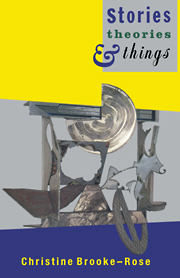2 - Whatever happened to narratology?
Published online by Cambridge University Press: 20 August 2009
Summary
It got swallowed into story seems the obvious answer, it slid off the slippery methods of a million structures and became the story of its own functioning. Like mathematics, which has never claimed to speak of anything but itself, or even to speak at all.
But was it a good story? Did narratology ever have that air of a neo-divine activity in which to formulate is to function and to function is to self-verify? Even in physics, there are always differences and disturbances, escape-hatches which mean that, however minute the particles or the units observed, the system has to adjust, to cheat ever so slightly, in order to present a good theory, to tell a coherent story. Reality is a scandal, it never quite fits.
Discourse, texts of all kinds, purport to represent the real, but what does this mean? Is the representation in excess of the real (Aristotle), or less than the real (Plato), or does it merely reorganize the real? These are ancient questions, but we are still asking them, not just of representations (stories) in general, but also of the very discourses (stories) that purport to analyse stories, stories of people, stories of people reading stories of people, stories of people reading stories of the world.
East is East but sometimes West
The initial excitements and fairly rapid disappointments of narratology must have had to do with the early high claims of universality. But the laws discovered, though often couched in learned words, severe analyses and diagrams, even mathematical or logical formulas, often turned out to be over-general, and so rather trivial.
- Type
- Chapter
- Information
- Stories, Theories and Things , pp. 16 - 27Publisher: Cambridge University PressPrint publication year: 1991

